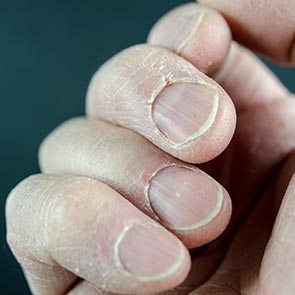Xerosis Cutis Treatment in Tarpon Springs, FL

If your dry, itchy, flaky, cracked, irritated, red or tight-feeling skin is annoying, painful, and unattractive you may have Xerosis Cutis.
This unusually dry skin that remains dry over long periods is most often treated with home remedies, but may also be a symptom of underlying health conditions like psoriasis or eczema. Your healthcare provider can diagnose or rule out more serious medical conditions.
To speak with a dry skin specialist today in Tarpon Springs, call (813) 536-3212 or contact Evolution online.
What are the symptoms of xerosis cutis?
Xerosis cutis is a result of environmental and lifestyle factors. Even showering in very hot water, living or working in dry surroundings, or not drinking enough water can cause skin dryness.
Older people are more likely to have dry skin. Hormonal changes related to natural aging makes your sweat glands less active, making your skin dry out faster. Having diabetes also increases your chances of experiencing abnormally dry skin. Cold, dry winter months with little or no humidity also contribute to you having dry skin.
This condition is characterized by the following symptoms:
- dry, itchy, scaly skin, especially on arms, legs, lower back, and the backs of your hands
- tight-feeling skin, especially right after bathing
- white flakes peeling off your skin
- red or pink irritated skin
- skin that cracks and may bleed
Many other medical conditions like psoriasis, ringworm, and eczema can cause very similar symptoms. See your healthcare provider if you're experiencing:
- skin oozing blood or fluid
- large patches of skin that are peeling off
- a rash shaped like a ring
- skin not improving or intensifying after home treatments
Preventing Xerosis Cutis
You can prevent the pain and aggravation of dry skin, especially during winter months, by:
- changing your diet to nourish your skin from the inside out
- bathing only once daily in warm (but not hot) water for 15 minutes or less
- using a humidifier in your home and workplace
- avoiding harsh soaps
- gently patting your skin dry instead of rubbing it roughly with a towel
- using very soft towels instead of rough ones
- moisturizing your skin right after bathing, while your skin is still damp
- using oil-based creams and ointments, which work better than water-based lotions
- limiting your time outdoors during harsh, dry winter months
- covering as much of your skin as possible during winter and very hot summer months
- using moisturizing sunscreen during periods of sun exposure, including when you participate in winter sports like skiing, snowmobiling, and snowboarding
- limiting your time in direct sunlight, even on sunny winter days; sunlight reflects off the snow and can give you sunburn
Xerosis Cutis Treatment
These over-the-counter products may help soothe surface symptoms, but don't tackle hydration deeper health causes: urea and propylene glycol-based lotions and ointments, cortisone creams, infection-fighting topical antibiotics, aspirin-containing alpha-hydroxy or beta-hydroxy acid preparations, and prescription strength corticosteroid creams.
Petroleum jelly, a byproduct of the oil industry, locks in moisture but doesn't moisturize; long-term use may cause adverse health effects.
To avoid the dyes, fragrances, and other ingredients in these products that may cause side effects, try moisturizing with: olive oil, almond oil, avocado oil, wheat germ oil, flaxseed oil, coconut oil, sunflower oil or honey.
Colloidal oatmeal in a bath binds to your skin and forms a protective barrier, while sealing in moisture and soothing inflammation – and cleans your skin as well.
To target the cause behind the dryness, try moisturizing from the inside out. Avoid sugar, processed foods, and allergens, and eat as much of these as possible:
- healthy fats: polyunsaturated and monounsaturated fats in nuts, seeds, and avocados; the omega-3s in fish are anti-inflammatories that reduce skin irritation
- zinc: found in whole grains, shellfish, nuts, and poultry; stimulates the skin to produce natural oils, and improves thyroid function which may affect skin appearance
- vitamin E: this antioxidant stimulates skin growth; found in hazelnuts, sunflower seeds, pine nuts, and almonds
- milk: studies suggest that phospholipids in milk can improve your skin barrier
If you've tried home remedies without getting relief, your healthcare provider may suggest you undergo blood tests for allergies or a skin biopsy.
Reserve Your Appointment Now
While very dry, itchy, and irritated skin can be painful and annoying, it usually isn't a sign of a serious medical concern, and in most cases can be treated at home, from the inside out.
But if you notice severe symptoms or your skin doesn't respond to diet changes and home remedies, your health provider can diagnose or rule out any underlying conditions.
To speak with a dry skin specialist today in Tarpon Springs, call (813) 536-3212 or contact Evolution online.
Evolution
Address
4691 Van Dyke RoadLutz, FL 33558
(813) 536-3212
www.evolution4health.com
Hours
Mon:
10:00 am - 4:00 pm
Tue:
10:00 am - 4:00 pm
Wed:
10:00 am - 5:00 pm
Thu:
10:00 am - 6:00 pm
Fri:
10:00 am - 3:00 pm
Sat:
Closed
Sun:
Closed

